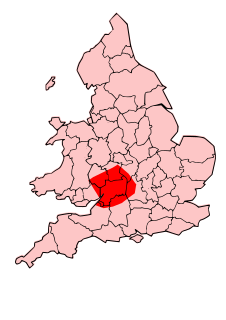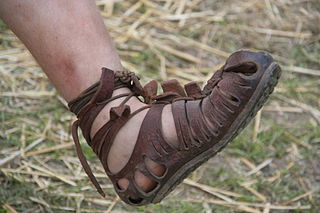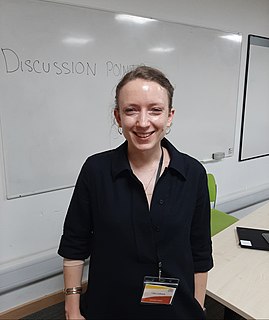
Calleva Atrebatum was originally an Iron Age settlement, capital of the Atrebates tribe, and subsequently a town in the Roman province of Britannia. Its ruins lie to the west of, and partly beneath, the Church of St Mary the Virgin, Silchester, in the county of Hampshire. The church occupies a site just within the ancient walls of Calleva, although the village of Silchester itself now lies about a mile (1.6 km) to the west.

The Dobunni were one of the Iron Age tribes living in the British Isles prior to the Roman invasion of Britain. There are seven known references to the tribe in Roman histories and inscriptions.
Daniel Miller is an anthropologist who is closely associated with studies of human relationships to things, the consequences of consumption and digital anthropology. His theoretical work was first developed in Material Culture and Mass Consumption and is summarised more recently in his book Stuff. This is concerned to transcend the usual dualism between subject and object and to study how social relations are created through consumption as an activity.

Caligae are heavy-soled hobnailed military sandal-boots known for being issued to Roman legionary soldiers and auxiliaries throughout the Roman Republic and Empire.

The Society for the Promotion of Roman Studies was founded in 1910 as the sister society to the Society for the Promotion of Hellenic Studies.
Patricia Southern is an English historian of classical Rome.
Calceology is the study of footwear, especially historical footwear whether as archaeology, shoe fashion history, or otherwise. It is not yet formally recognized as a field of research. Calceology comprises the examination, registration, research and conservation of leather shoe fragments. A wider definition includes the general study of the ancient footwear, its social and cultural history, technical aspects of pre-industrial shoemaking and associated leather trades, as well as reconstruction of archaeological footwear.

The Late Roman ridge helmet was a type of combat helmet of Late Antiquity used by soldiers of the Late Roman army. It was characterized by the possession of a bowl made up of two or four parts, united by a longitudinal ridge.
Lindsay Allason-Jones, is a British archaeologist and museum professional specialising in Roman material culture, Hadrian's Wall, Roman Britain, and the presence and role of women in the Roman Empire. She is currently a Visiting Fellow at Newcastle University.

The Theoretical Roman Archaeology Conference (TRAC) is an academic organisation and conference which was designed to be an arena for open discussion of archaeological theory in Roman archaeology.
Ellen Swift is a British archaeologist and Professor of Roman Archaeology at the University of Kent.
Hella Eckardt is an archaeologist who specialises in Roman archaeology and material culture and a Professor at the University of Reading. Since 2018 she has been the Editor of the journal Britannia.

Lisa Lodwick is an archaeologist who studies charred, mineralised and waterlogged macroscopic plant remains, and uses carbon and nitrogen stable isotope analysis to understand the crop husbandry practices of the ancient Romans.
Cold War Steve is the nom de plume of Christopher Spencer, a British collage artist and satirist. He is the creator of the Twitter feed @Coldwar_Steve. His work typically depicts a grim, dystopian location in England populated by British media figures, celebrities, and politicians, usually with Eastenders actor Steve McFadden looking on in disgust. His work has been described as having "captured the mood of Brexit Britain" and likened to earlier British political satirists Hogarth and Gillray. As of February 2020, his account has over 240,000 followers.

Zena Kamash FSA is a British Iraqi archaeologist and senior lecturer at Royal Holloway, University of London. Her research topics include water, food, memory, the Roman period in the Middle East and Britain.
Carol van Driel-Murray is a Roman archaeologist who specialises in the role of women and studying leather. After studying at the University of Liverpool, van Driel-Murray worked at the University of Amsterdam for 37 years and the University of Leiden for three before she retired in 2015.
Louise Revell is a Roman archaeologist, currently Associate Professor in Roman Studies at the University of Southampton. Revell's research focuses on provincial archaeology of the western Roman empire.

Elena Isayev is Professor of Ancient History and Place in the Classics and Ancient History Department at the University of Exeter. She is an expert on migration, hospitality and displacement, particularly in ancient Mediterranean contexts. She works with Campus in Camps in Palestine and she is a Trustee of the charity Refugee Support Devon.
Rebecca Gowland is a bioarchaeologist. She is a Professor of Archaeology at Durham University.
Nina Crummy is a British archaeologist and artefact specialist, especially of Roman material culture.








